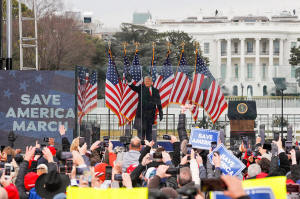US Supreme Court due to rule on Trump's immunity bid in blockbuster case
 Send a link to a friend
Send a link to a friend
 [July 01, 2024]
By John Kruzel [July 01, 2024]
By John Kruzel
WASHINGTON (Reuters) - The U.S. Supreme Court's highly anticipated
ruling on former President Donald Trump's bid for immunity in a federal
criminal case involving his efforts to overturn his 2020 election loss
is expected on Monday, the final day of its current term.
The court, whose 6-3 conservative majority includes three justices Trump
appointed, seemed inclined during April 25 arguments to recognize some
level of criminal immunity, though perhaps a narrower version than the
"absolute immunity" for official acts that he had sought.
Trump is the Republican candidate challenging Democratic President Joe
Biden in the Nov. 5 U.S. election in a rematch from four years ago.
However it rules, the court's slow handling of the blockbuster case
already has helped Trump by making it unlikely that any trial on these
charges brought by Special Counsel Jack Smith could be completed before
the election.
The Supreme Court is due to rule on Trump's appeal of a lower court's
decision rejecting his immunity claim.
Trump had argued that he is immune from prosecution because he was
serving as president when he took the actions that led to the charges.
Smith has opposed presidential immunity from prosecution based on the
principle that no one is above the law.
During the arguments, Trump's legal team had urged the justices to fully
shield former presidents from criminal charges for official acts taken
in office. Without such immunity, Trump's lawyer said, sitting
presidents would face "blackmail and extortion" by political rivals due
to the threat of future prosecution.

Trump, 78, is the first former U.S. president to be criminally
prosecuted as well as the first former president convicted of a crime.
In the special counsel's August 2023 indictment, Trump was charged with
conspiring to defraud the United States, corruptly obstructing an
official proceeding and conspiring to do so, and conspiring against the
right of Americans to vote. He has pleaded not guilty.
Trump's trial had been scheduled to start on March 4 before the delays
over the immunity issue. Now, no trial date is set. Trump made his
immunity claim to the trial judge in October, meaning the issue has been
litigated for about nine months.
In a separate case brought in New York state court, Trump was found
guilty by a jury in Manhattan on May 30 on 34 counts of falsifying
documents to cover up hush money paid to a porn star to avoid a sex
scandal before the 2016 election. Trump also faces criminal charges in
two other cases. He has pleaded not guilty in those and called all the
cases against him politically motivated.
A lawyer for the special counsel's office told the Supreme Court during
arguments that the "absolute immunity" sought by Trump would shield
presidents from criminal liability for bribery, treason, sedition,
murder and, as in this case, trying to overturn the proper results of an
election and stay in power.
During the arguments, justices asked hypothetical questions involving a
president selling nuclear secrets, taking a bribe or ordering a coup or
political assassination. If such actions were official conduct, Trump's
lawyer argued, a former president could be charged only if first
impeached by the House of Representatives and convicted in the Senate -
something that has never happened in U.S. history.
[to top of second column]
|

U.S. President Donald Trump waves to supporters during a rally to
contest the certification of the 2020 U.S. presidential election
results by the U.S. Congress, in Washington, U.S, January 6, 2021.
REUTERS/Jim Bourg/File Photo

In a May Reuters/Ipsos poll, just 27% of respondents - 9% of
Democrats, 50% of Republicans and 29% of independents - agreed that
presidents should be immune from prosecution unless they have first
been impeached and convicted by Congress.
A PLODDING TIMELINE
Smith, seeking to avoid trial delays, had asked the justices in
December to perform a fast-track review after Trump's immunity claim
was rejected by U.S. District Judge Tanya Chutkan that month. Trump
opposed the bid. Rather than resolve the matter promptly, the
justices denied Smith's request and let the case proceed in a lower
court, which upheld Chutkan's ruling against Trump on Feb. 6.
The immunity ruling comes 20 weeks after Trump on Feb. 12 sought
relief from the Supreme Court. By contrast, it took the court less
than nine weeks in another major case to reinstate Trump to the
presidential primary ballot in Colorado after he appealed a lower
court's ruling that had disqualified him for engaging in an
insurrection by inciting and supporting the Jan. 6, 2021, attack on
the U.S. Capitol by his supporters.
The timeline of the court's immunity ruling likely does not leave
enough time for Smith to try Trump on federal election subversion
charges and for a jury to reach a verdict before voters head to the
polls.
Trump took numerous steps to try to reverse his 2020 loss to Biden.
Federal prosecutors have accused Trump of pressuring government
officials to overturn the election results and encouraging his
supporters to march to the Capitol on Jan. 6, 2021, to push Congress
not to certify Biden's victory, based on false claims of widespread
voting fraud. Trump supporters attacked police and stormed the
Capitol, sending lawmakers and others fleeing. Trump and his allies
also are accused of devising a plan to use false electors from key
states to thwart certification.
Not since its landmark Bush v. Gore decision, which handed the
disputed 2000 U.S. election to Republican George W. Bush over
Democrat Al Gore, has the Supreme Court played such an integral role
in a presidential race.
Trump also faces election subversion charges in state court in
Georgia and federal charges in Florida brought by Smith relating to
keeping classified documents after leaving office.
If Trump regains the presidency, he could try to force an end to the
prosecution or potentially pardon himself for any federal crimes.
(Reporting by John Kruzel; Editing by Will Dunham and Scott Malone)
[© 2024 Thomson Reuters. All rights reserved.]This material
may not be published, broadcast, rewritten or redistributed.
Thompson Reuters is solely responsible for this content.
 |